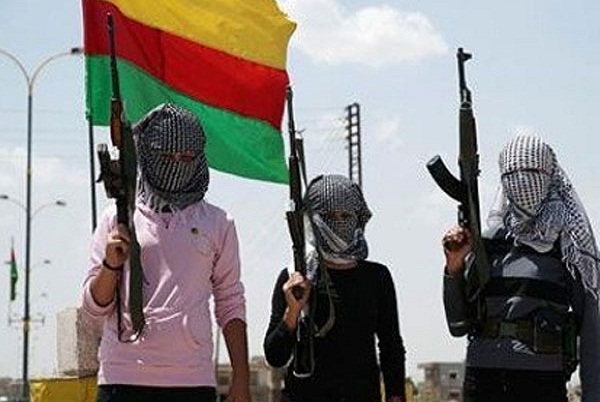We’ve published this interview called “Libertarian communalism and self-government in Syria” made by an internationalist comrade who prefered remains anonymous, but encouraging to extend the debate about the Syrian revolution along the world. The main questions treats on cultural and political relations (and too the radical differences) between the Arab autonomous councils that have been formed since the revolution start on 2011, the Kurdish parties organizative forces and the connotation of try hegemonize the Middle East conflicts of imperialist countries, in a way to understand all advances and gains of this armed process for a better life for the most important subject in this scenario: the communities & people.
– Hello, Fatima! Please tell us about the local self-government the Arabs and Kurds in Syria.
Hi, comrade! I think on the local level, through the communes, there is some local autonomy and self-organization at least to make very local level decisions. But in general what has happened, majority structures and decision making is very top down, PYD led and controlled (PYD is Kurdish party supporters of Abdullah Öcalan, the Syrian branch of PKK). I think the question is how to support more radical elements and the energy that has been unleashed now with Kurdish youth and not support PYD project. The Arab project has been much more bottom up. It is not party led, but brings together people from different backgrounds for practical buisness of self-organizing communities. In this way I find it more progressive. But there are also big challenges, still there is limited participation of women in council positions. They are also under much more challenges, attacks by regime -jihadists- lack of visibility or support.
– Are you an anarchist or libertarian socialist?
I would have replied anarchist, but I am getting less and less comfortable with using labels… I think it is european dominant anarchism which has put me off this self-identification too… there is a blindness and an unwillingness to see problems -or understand context- a very romantic vision and those of us that try to raise awarness of PYD authoritarism get slandered as Arab nationalists or jihadi supporters…
– So can you tell me is there ane self-governments in Syria also in shiaa areas like Fua or in Alavite Latackia?
It is not permitted by the regime. In the earlier years of the revolution there was organization of committees, bringing together Alawi and Sunni, etc. activists for protests etc. But self- government would be impossible.
– How powerful are Arab tribes in the Syrian towns? Do they influence self-government? For example, in Palestine Homula (arab tribe) has a great impact on the lives of Arab societies almost everywhere. In Syria is it the same?
Depends. In some areas they are powerful. They often participate in local councils in those areas.
– What do you think happens if Shiaa coalition (Iran+Hizballa+Iraqi Shiaa+Fatimiyuun of hazarians+Asad) win the war in the most part of Syria? Is that like Iran’s occupation?
I think they will win the war and with the help of the West too in the ‘war on terror’. The Arab areas now being destroyed, from without and within, nearly over and Rojava will then be targetted. I think we can already talk of an Iranian/Ru occupation in large parts of the country, the regime is finished, it does not exist, it is completely dependent on outsiders maybe there will be a partition with different groups/powers having control of different areas.
– But I am not sure about Rojava permanence, it could be under USA controll more and more.
Yes, but USA is aligning with regime more and more if there is a partition, maybe there will still be a Rojava but I imagine with more central government control.
– Why do you think so?
I do not believe there was ever a ‘regime change’ plot. Even under Obama, there was a call for Assad to go, but never to dismantle the regime. Like in Yemen. There was a lot of rhetoric about supporting the opposition but in reality it was limited, nothing like what we see for PYD now. The USA was responsible for blocking other countries sending heavy weapons to FSA (Free Syrian Army). Now under Trump there is an increasing consensus (and I think in the west more generally) that Assad should stay in the interests of ‘stability’ and ‘fighting terrorism’. The USA tried to work with FSA to fight ISIS on condition they drop fight against Assad, they didn’t get hardly any groups to sign up, so they go will newly created SDF (Syrian Democratic Forces is a coalition of the Kurdish militia YPG and Arab militias, which is under the control of YPG and PYD).
– I have information that some Arab militias and tribes are fightin together wit SDF today and there are alot of them.
Yes, of course, there are many Arab groups fighting with SDF. For me, I cannot feel positive about SDF, it is operating as a USA proxy force. I think also people make too much of Arab participation in SDF or PYD structures. It’s a political issue here, not ethnic. Many kurds fight with FSA -even Kurds with Daesh- the attack on Kobane was led by Kurd and in the councils in Arab majority mixed communities there has always been participation from other groups (Kurds -like Manbij-, Christians -in Yabrood-, Ishamaili -in Salamiya-, etc.) Also we have to ask about some of the Arab groups in the SDF. Some of them are very pro-Assad. The Manbij military council has 2 Arabs on it that are even members of regime parliament. So I have questions.
But of course, there is also a lot of support for SDF from all different groups, they are fighting Daesh, they are liberating communities from Daesh rule. But I do not think they will be obidient to PYD all the time….
Alliances are quickly formed and dimantled in war, based on necessity and what is most useful at the time. Especially in the North the tribal relations are also very complex and play a big role. I cannot even pretend to understand all of that and the role it plays.
1,309 total views, 4 views today

